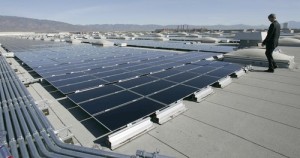Before we can rush the QB.
Cheat or die
M: There’s also the case made in the book [by the Earth Policy Institute’s Lester Brown] for a large-scale transference of manufacturing in the U.S. from auto to things like wind turbines. How realistic do you think that is?
GD: I think Lester Brown is a saintly person who is not entirely of this world, as saintly people often are not. And while it makes a great rhetorical point, those factories would not just have to be re-opened, they’d have to be hugely re-tooled. So, I quoted Lester Brown and then I immediately argued with him. I like that man, but I don’t really think he’s my guide on these matters.
M: But there is a kernel of truth there.
GD: There’s certainly more than a kernel of truth in it. This is not a hard problem to solve. This is a straightforward problem. You’ve got to get out of fossil fuels. We have the alternatives. Go. If the political will is there, that will happen. I think, therefore, it will happen, sooner or later. The problem is, it’ll probably be later.
M: Do you think it will be too late?
GD: I think it may be, in which case you need some kind of get-out-of-jail-free card, to win yourself a couple of more decades to get your emissions down. So you don’t want to go beyond two degrees Celsius, you’ve got too much carbon dioxide in the air which will take you past two degrees Celsius, and you still haven’t got your emissions down as far as you should. What do you do?
M: Blast sulfur dioxide into the air?
GD: That’s right, that sort of thing. Just to win time. You’re not solving the problem, you shouldn’t imagine you’re solving the problem. You’re winning yourself time to solve the problem, the right way. So when I include that in the picture, there is a way to cheat, then I can feel more optimistic about the future.
The M is the Montreal Mirror and GD is Gwynne Dyer, author of the recently released Climate Wars. From an interview between the two.

